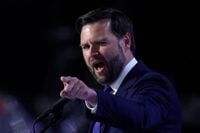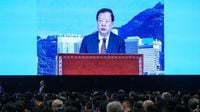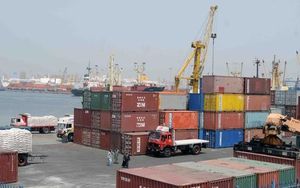In a striking interview with UnHerd on April 14, 2025, Vice President JD Vance emphasized the need for Europe to break free from its status as a "permanent security vassal" of the United States. This statement comes amid a backdrop of financial turmoil triggered by President Trump's recent tariff policies on European allies, which have raised eyebrows across the Atlantic.
Vance's remarks reflect a growing concern about the transatlantic relationship, particularly following Trump's "Liberation Day" tariffs that were partially rescinded. The Vice President's comments aim to reassure European leaders that the U.S. still values its alliances, but he insists that they must take more initiative on the global stage, especially regarding immigration and security issues.
"I love Europe," Vance stated, showcasing a diplomatic tone not always present in his previous communications. He noted the deep cultural ties between the U.S. and Europe, stemming from shared philosophies and migration patterns. However, he expressed frustration with European leaders who, in his view, are not adequately addressing the concerns of their citizens regarding immigration and integration.
Vance's critique extends to the current state of European security, which he believes has been heavily subsidized by the U.S. for decades. He stated, "The reality is — it’s blunt to say it, but it’s also true — that Europe’s entire security infrastructure, for my entire life, has been subsidised by the United States of America." He noted that many European nations have underinvested in their military capabilities, a situation he argues must change for the continent to ensure its own defense.
In a parallel development, Chinese officials have reacted sharply to the Trump administration's tariff policies. On April 15, 2025, Xia Baolong, the director of China's Hong Kong and Macau Affairs Office, labeled the U.S. tariffs as "extremely shameless" and remarked, "Let those peasants in the United States wail in front of the 5,000 years of Chinese civilization." This statement underscores the tensions between the two nations as the trade war escalates.
Vance, in a previous interview, criticized the U.S. economy's dependency on foreign manufacturing, stating, "To make it a little bit more crystal clear, we borrow money from Chinese peasants to buy the things those Chinese peasants manufacture." He argues this model is detrimental to American economic prosperity and job creation.
As Vance navigates these complex international waters, he also addressed the ongoing situation in Ukraine. He has condemned Russia's actions since the invasion in 2022, but he advocates for understanding the strategic objectives of both Russia and Ukraine. Vance stated, "I think it’s sort of absurd for Zelensky to tell the [American] government, which is currently keeping his entire government and war effort together, that we are somehow on the side of the Russians." He insists that acknowledging the realities of the conflict does not equate to supporting Russia's aggressive actions.
Vance's broader message to European leaders is clear: they must take more responsibility for their own security and immigration policies. He believes that open-borders policies undermine democratic trust, stating, "The entire democratic project of the West falls apart when the people keep on asking for less migration, and they keep on being rewarded by their leaders with more migration." This frustration echoes a sentiment shared by many voters in Europe who seek more sensible migration policies.
In discussing trade relations, Vance highlighted the administration's ongoing efforts to negotiate a favorable trade deal with the United Kingdom under Keir Starmer's government. He expressed optimism about reaching an agreement that benefits both nations, emphasizing the cultural affinity between the U.S. and the UK. "The President really loves the United Kingdom... There’s a real cultural affinity," Vance remarked.
While Vance maintains that the U.S. seeks to foster positive trade relationships with Europe, he cautioned that these relationships should reflect a sense of independence. He stated, "I think there’s a good chance that, yes, we’ll come to a great agreement that’s in the best interest of both countries." However, he noted that negotiations with other European nations may be more challenging.
As the Trump administration grapples with the implications of its tariff policies, Vance articulated the administration's long-term vision for trade. "What we want to see is lower trade deficits, really across the board," he said, acknowledging the complexities involved in achieving this goal. He pointed out that while some trade deficits are justifiable, the overarching trend of persistent deficits is unsustainable.
Moreover, Vance's perspective on social media reveals a more personal side to his role as Vice President. He acknowledged the challenges of engaging with the public while under constant security scrutiny, stating, "I see social media as a useful, albeit imperfect, way to stay in touch with what’s going on in the country at large." This candidness adds a relatable dimension to his otherwise high-profile position.
In light of these developments, the Trump-Vance administration remains committed to redefining its approach to globalization. Vance concluded, "We’re not on anybody’s side, we’re on America’s side," signaling a shift in foreign policy that prioritizes American interests while encouraging allies like Europe to step up.
The ongoing dialogue between the U.S. and its allies, as well as adversaries like China, will undoubtedly shape the geopolitical landscape in the years to come. As Vance navigates these complicated relationships, his call for a more independent Europe and a restructured trade system reflects a significant pivot in American foreign policy.





